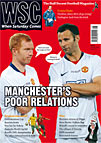 Dear WSC
Dear WSC
Regarding Simon Cotterill’s article in WSC 269. Indeed it is rare that many J‑League clubs sell out tickets for many games but this doesn’t tell the whole story about Japanese football. First of all, the World Cup crowds were different to those at ordinary J-League games. I’m not sure if it’s the same case in England but the media strongly encouraged people to cheer on the national team, which is followed on a four-year cycle only at major tournaments or in qualifying. Secondly, J-League attendances did decrease quickly after the initial boom but a football culture is developing and the supporters who go regularly understand the game a lot more. This can be seen at Urawa Reds and Albirex Niigata who both use stadiums built for the 2002 World Cup and sell out all their home games. It’s not just Japan and Korea where there are problems with attendances – English football has them too, as can be seen at the half-empty Ewood Park or Riverside Stadium.
Kazutaka Watanabe, Atsugi, Japan
Search: 'Fan culture'
Stories
 Latvia's unstable economy has affected football too, as Daunis Auers explains
Latvia's unstable economy has affected football too, as Daunis Auers explains
The 2009 Latvian Virsliga season kicked off in mid-March under cold and dark skies. So cold and dark, in fact, that pitches across the country remained frozen, forcing games to be played at the Riga Olympic Centre, a modest indoor facility with a tight, vertigo-inducing balcony along one side of the pitch. Two rows of free-standing chairs give it a capacity of about 300.
 Huw Richards responds to Roberto Martinez's departure as manager of Swansea
Huw Richards responds to Roberto Martinez's departure as manager of Swansea
In WSC 269 I suggested that Swansea fans “would not swap Roberto Martínez for anyone”. It was incontestably true when written, but by the time of publication anyone reading Swans websites could reasonably have assumed that the club had instead been managed by somebody called Judas. Some of that abuse came from the traditional inability of many fans to grasp that, whatever a club is to them, it is an employer to a player or manager. It also, though, reflected what Martínez had come to mean to Swansea.
 Going to your first football match isn't always memorable for the normal reasons, as Josh Widdicombe explains
Going to your first football match isn't always memorable for the normal reasons, as Josh Widdicombe explains
With the exceptions of the third round of the FA Cup and the career of Stan Bowles, few things are over-romanticised by the average football fan more than their first visit to a live match. So, as a man easily won over by a nostalgic ideal, I have long bought into the received wisdom that to be a proper fan your first taste of professional football in the flesh must have been like some sort of religious conversion; rather than just sitting in a cold church hoping the monotonous service would soon be over.
 Charlton have gone from being a well-run Premier League club to an institution defined by calamitous mismanagement on and off the pitch. Mick Collins examines a cautionary tale
Charlton have gone from being a well-run Premier League club to an institution defined by calamitous mismanagement on and off the pitch. Mick Collins examines a cautionary tale
After two relegations in three years, Charlton fans have become used to looking for silver linings, however hard they’ve been to locate. Of very limited consolation, though, has been the ease with which we can now start a footballing conversation. No matter how remote the setting, a mention of your allegiance to anyone with even the vaguest of interest in the game, brings a guaranteed response: “What’s gone wrong at The Valley, then?”